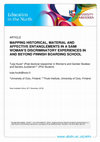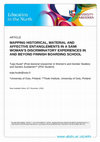Papers by Sandra Juutilainen

Education in the North, 2016
This paper draws on new feminist materialist and posthuman theories to explore discrimination exp... more This paper draws on new feminist materialist and posthuman theories to explore discrimination experienced by Sámi attendees at Finnish boarding schools. The aim is to shift attention away from the human actor to a wider field of power relations, and consider discrimination as force relations, emerging dynamically through assemblages of, for example, material, corporeal, historical, organic, discursive and affective elements. The case study, taken from the structured interview survey data from one Sámi woman, is used to demonstrate material, affective and historical forces, through which events of discrimination emerge. We argue that material objects and places and their histories are not inert, fixed backgrounds against which things occur, nor important contextualising features of situated events. Rather, they can be seen as significant actants in the rendering of the Sámi as the Other. Recognising how traces of place and history and material objects become revitalised within acting assemblages can provide some powerful insights into the barriers and opportunities the Sámi boarding school students encountered in their everyday lives and how they coped with experiences later in life.
Human Biology, 2019
Indigenous individuals and communities have experienced historic and ongoing negative interaction... more Indigenous individuals and communities have experienced historic and ongoing negative interactions with Western health care and biomedical research. To rebuild trust and mitigate power structures between researchers and Indigenous peoples, researchers can adopt Indigenous epistemologies in methodologies, such as nonhierarchical approaches to relationship. This article shares models developed to bridge Indigenous epistemologies with Western qualitative and quantitative research methods and
demonstrates how these epistemologies can be used to guide the authors’ development of a pilot study on traumatic spinal cord injury.
Citation: Juutilainen, S.A. (2017). Haudenosaunee women as mothers of the nation:

This paper draws on new feminist materialist and posthuman theories to explore discrimination exp... more This paper draws on new feminist materialist and posthuman theories to explore discrimination experienced by Sámi attendees at Finnish boarding schools. The aim is to shift attention away from the human actor to a wider field of power relations, and consider discrimination as force relations, emerging dynamically through assemblages of, for example, material, corporeal, historical, organic, discursive and affective elements. The case study, taken from the structured interview survey data from one Sámi woman, is used to demonstrate material, affective and historical forces, through which events of discrimination emerge. We argue that material objects and places and their histories are not inert, fixed backgrounds against which things occur, nor important contextualising features of situated events. Rather, they can be seen as significant actants in the rendering of the Sámi as the Other. Recognising how traces of place and history and material objects become revitalised within acting assemblages can provide some powerful insights into the barriers and opportunities the Sámi boarding school students encountered in their everyday lives and how they coped with experiences later in life. . We attempt to make these complexities visible by broadening the scope of analysis to produce new insights into the dialogue and exploring how history and material objects are entangled as affective intensities in the discrimination experienced by the Sámi. To understand this, we were drawn to consider the specific materiality and history of the place that might be impacting Sámi people's experiences in and beyond boarding school. We came to recognise that discriminatory practices were often tied to material objects and places (Guattari, 1995(Guattari, /2005 in the interview talk of the Sámi, and how places and objects produced strong affective charges for them. We identified some of these experiences as part of a larger scale refrain and thus the past became present as repeated similarity in the respondents' interview talk. (See Ivinson and Renold, 2013b.) In exploring the affective, material and historical entanglements of the discriminatory experiences of the Sámi in and after boarding school, we present interview data from one Sámi woman, which illustrates how discrimination is not merely discursive or linguistic, but a product of various human and non-human forces which carry affective traces of the past. In our conclusion we briefly suggest that recognising how material objects as well as traces of place and history become revitalised within acting assemblages can provide some powerful insights into the barriers and new opportunities Sámi boarding school students encountered in their everyday lives and how they coped later in life.
The International Indigenous Policy Journal, 2014
The objective of this study was to explore, as an example of structural racism, the effects of re... more The objective of this study was to explore, as an example of structural racism, the effects of residential school and boarding school on the self-perceived health of Indigenous peoples' in Canada and Finland. Structured interviews were conducted at Six Nations of the Grand River and Inari municipality. The individual and intergenerational negative effects included themes of vulnerability (language and cultural loss, fractured identity, and negative self-worth), and resilience (Indigenous identity, language and cultural renewal). Indigenous identity, culture, and language are intertwined and key determinants of health. Further studies about structural racism and a strong Indigenous identity as a protective factor may provide valuable insight into health disparities.
Contributing author to chapter in report by Sandra Juutilainen
Book Reviews by Sandra Juutilainen
Books by Sandra Juutilainen

Ethics in research related to Indigenous peoples has, over recent decades, been increasingly disc... more Ethics in research related to Indigenous peoples has, over recent decades, been increasingly discussed in a global context. Decolonizing theories and methods have gained legitimacy and prestige, and Indigenous scholarship has challenged mainstream research by adding novel perspectives and critical standpoints that encourage researchers of all origins to reflect upon their own positions within the colonial academic and social structures in which they work. This development has taken different directions and occurred at different speeds depending on local, regional and national settings. In a Swedish Sami research context, we are now in a time when it is clear that things are moving and discussions on research ethics are taking place on a more regular basis. This publication is one example of that. In Sweden, it is the first one in English that addresses ethics in Sami and indigenous research and this will, hopefully, facilitate collaborations, comparisons and discussions on an international scale.
The book is based on some of the contributions to the international workshop Ethics in Indigenous Research, Past Experiences – Future Challenges that was held in Umeå in March 2014. The workshop gathered together around fifty scholars from different parts of Sápmi and abroad, and aimed to move forward Indigenous research ethics in Sweden by highlighting and addressing research ethics related to the Sami and Indigenous research field. It is hoped that this book will serve as an inspiration, a critique, and an illustration of where discussions are heading in a Nordic, and more specifically, Swedish context. It is intended to function as a foundation for future ethical discussions at different levels, in national and international settings both within and outside academia.
The purpose of the study was to broaden understanding of structural racism by examining the relat... more The purpose of the study was to broaden understanding of structural racism by examining the relationships between Indigenous peoples and nation-states in the context of education and how this affects Indigenous lives. This thesis delves into understanding both the theoretical and methodological contributions that more critical analyses can have on: the role of de-colonial approaches to Indigenous health research methodologies so that the most urgent health inequities are addressed through more rigorous and Indigenous specific research processes; and to improve our understanding of the complex interactions that historical and contemporary legacies of residential schools and boarding schools have on the health and well-being of Indigenous populations in Canada and Finland.











Uploads
Papers by Sandra Juutilainen
demonstrates how these epistemologies can be used to guide the authors’ development of a pilot study on traumatic spinal cord injury.
Contributing author to chapter in report by Sandra Juutilainen
Book Reviews by Sandra Juutilainen
Books by Sandra Juutilainen
The book is based on some of the contributions to the international workshop Ethics in Indigenous Research, Past Experiences – Future Challenges that was held in Umeå in March 2014. The workshop gathered together around fifty scholars from different parts of Sápmi and abroad, and aimed to move forward Indigenous research ethics in Sweden by highlighting and addressing research ethics related to the Sami and Indigenous research field. It is hoped that this book will serve as an inspiration, a critique, and an illustration of where discussions are heading in a Nordic, and more specifically, Swedish context. It is intended to function as a foundation for future ethical discussions at different levels, in national and international settings both within and outside academia.
demonstrates how these epistemologies can be used to guide the authors’ development of a pilot study on traumatic spinal cord injury.
The book is based on some of the contributions to the international workshop Ethics in Indigenous Research, Past Experiences – Future Challenges that was held in Umeå in March 2014. The workshop gathered together around fifty scholars from different parts of Sápmi and abroad, and aimed to move forward Indigenous research ethics in Sweden by highlighting and addressing research ethics related to the Sami and Indigenous research field. It is hoped that this book will serve as an inspiration, a critique, and an illustration of where discussions are heading in a Nordic, and more specifically, Swedish context. It is intended to function as a foundation for future ethical discussions at different levels, in national and international settings both within and outside academia.